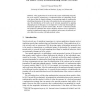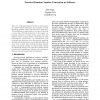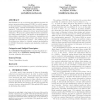98 search results - page 7 / 20 » An information theoretic approach for privacy metrics |
PAKDD
2009
ACM
14 years 5 months ago
2009
ACM
Many applications of social networks require relationship anonymity due to the sensitive, stigmatizing, or confidential nature of relationship. Recent work showed that the simple ...
ESAS
2007
Springer
14 years 14 days ago
2007
Springer
The promise of vehicular communications is to make road traffic safer and more efficient. However, besides the expected benefits, vehicular communications also introduce some priva...
SIGMOD
2009
ACM
14 years 8 months ago
2009
ACM
Many websites provide form-like interfaces which allow users to execute search queries on the underlying hidden databases. In this paper, we explain the importance of protecting s...
ACSAC
2003
IEEE
14 years 1 months ago
2003
IEEE
There is a large gap between the theory and practice for random number generation. For example, on most operating systems, using /dev/random to generate a 256-bit AES key is highl...
KDD
2004
ACM
14 years 1 months ago
2004
ACM
Randomization is an economical and efficient approach for privacy preserving data mining (PPDM). In order to guarantee the performance of data mining and the protection of individ...



